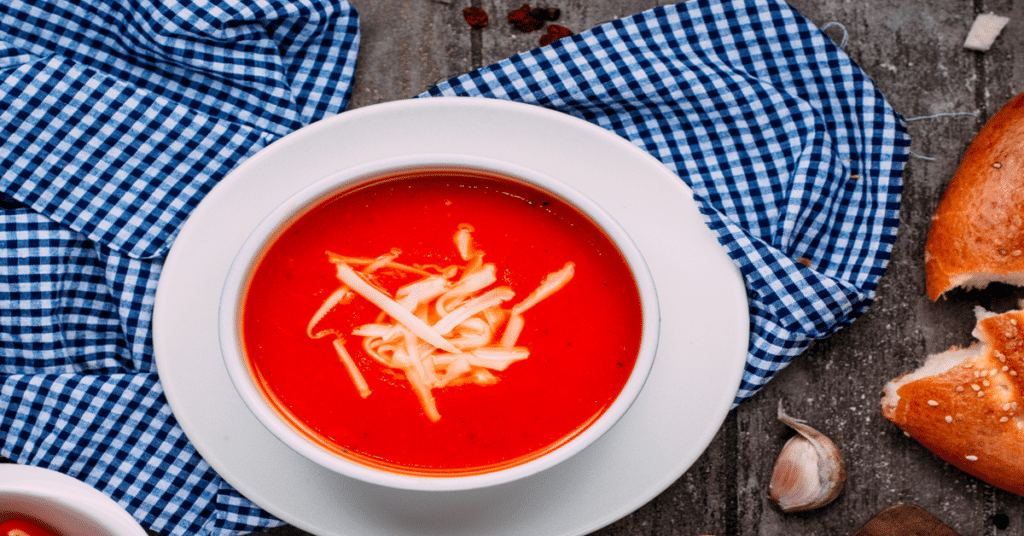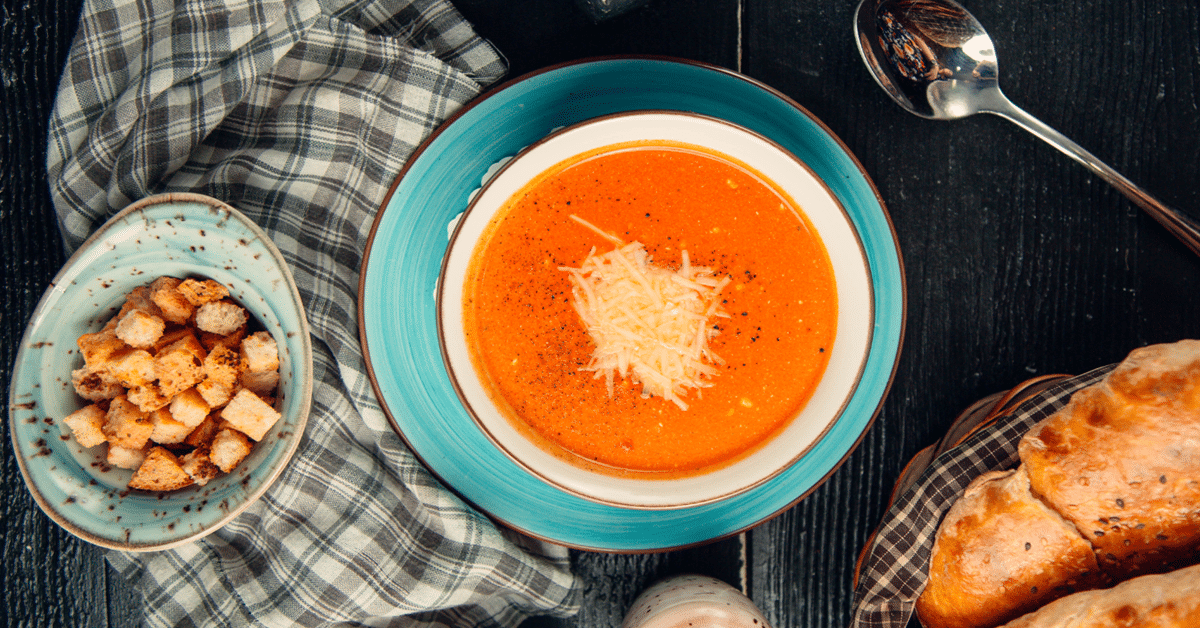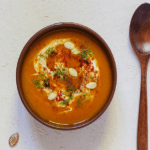If you’re looking for a comforting dish that combines smoky sweetness with creamy richness, slow roasted red pepper Gouda soup is the perfect choice.
By slow-roasting red bell peppers, you unlock their natural sweetness and smoky depth, creating a flavor-packed base for a hearty soup. When paired with the creamy indulgence of Gouda cheese, this dish becomes a crowd-pleaser for any occasion.
What sets this soup apart is the slow roasting technique, which enhances the natural flavors of the peppers.
What you will find in this article:
Why Slow Roasting Makes a Difference
Slow roasting isn’t just about cooking—it’s a transformative process. By roasting red bell peppers at a low temperature, you bring out their natural sugars, which caramelize to create a deep, smoky flavor. The result? A soup base that is rich, complex, and bursting with natural sweetness.
If you’re curious about the benefits of slow roasting, The Spruce Eats offers excellent tips for mastering the process.
Ingredients That Steal the Show
The beauty of slow roasted red pepper Gouda soup lies in its simplicity. Each ingredient plays a vital role in creating a balanced flavor profile.
Star Ingredients
- Slow Roasted Red Bell Peppers
- The main ingredient, providing sweetness and a slightly smoky undertone.
- High in vitamins A and C, these peppers are as nutritious as they are flavorful.
- Smoked Gouda Cheese
- Adds a creamy texture with a hint of smokiness.
- A rich source of calcium and protein, making the soup both satisfying and nutritious.
- Tomatoes
- Introduce acidity to balance the sweetness of the peppers.
- Packed with lycopene, a powerful antioxidant.
Supporting Ingredients
- Garlic and Onions: Provide aromatic depth to the soup.
- Vegetable Stock: Forms the savory base, enhancing the roasted flavors.
- Fresh Basil and Spices: For added freshness and complexity.

Step-by-Step Recipe: Slow Roasted Red Pepper Gouda Soup
Ingredients
- 4 large red bell peppers
- 1 medium onion, diced
- 4 garlic cloves, minced
- 2 large tomatoes, diced
- 5 oz smoked Gouda cheese, shredded
- 3 cups vegetable stock
- 2 tbsp olive oil
- 1 tsp smoked paprika
- Salt and pepper to taste
- Fresh basil for garnish
Instructions
- Slow Roast the Peppers
- Preheat the oven to 300°F (150°C).
- Slice peppers in half, remove seeds, and place them skin-side up on a baking sheet.
- Drizzle with olive oil and roast for 2–3 hours until the skins are wrinkled and slightly charred.
- Once cooled, peel off the skins and set the peppers aside.
- Prepare the Aromatics
- Heat olive oil in a large pot over medium heat.
- Add onions and sauté until translucent.
- Stir in garlic and smoked paprika, cooking until fragrant.
- Combine and Simmer
- Add the roasted peppers, tomatoes, and vegetable stock to the pot.
- Bring to a boil, then reduce heat and simmer for 20 minutes.
- Blend Until Smooth
- Use an immersion blender or a standard blender to puree the mixture until velvety smooth.
- Return the soup to the pot.
- Incorporate Gouda Cheese
- Stir in the shredded Gouda cheese until fully melted.
- Adjust seasoning with salt and pepper.
- Serve and Garnish
- Ladle the soup into bowls and garnish with fresh basil leaves.
- Pair with crusty bread or a side salad for a complete meal.
For those exploring cream-free options, don’t miss Roasted Red Pepper Gouda Soup No Cream for a dairy-free twist on this classic favorite.
The Science Behind Slow Roasting
Why Slow Roasting Transforms Flavors
Cooking is as much science as it is art, and slow roasting showcases this perfectly. When you slow roast red peppers, two key chemical reactions occur: caramelization and Maillard browning.
- Caramelization:
- As the natural sugars in red peppers are exposed to heat over a prolonged period, they break down into simpler compounds, creating a sweeter, richer flavor.
- This reaction also enhances the color, giving roasted peppers their deep red, slightly charred appearance.
- Maillard Browning:
- This reaction occurs between the amino acids and reducing sugars in the peppers, producing savory, umami flavors that make the soup taste more complex.
The Role of Temperature
Slow roasting at 300°F allows these reactions to unfold gradually, which intensifies the flavors without burning the peppers. Contrast this with high-heat roasting, which can sometimes char the exterior before the interior has a chance to develop sweetness.
Pro Tip: Rotate the peppers halfway through roasting to ensure even cooking and caramelization.
Benefits Beyond Flavor
- Nutritional Integrity:
- Slow roasting preserves more of the peppers’ nutrients compared to high-heat methods. Vitamins A and C, essential for immune health, remain intact.
- Improved Texture:
- Slow roasting softens the peppers evenly, making them easier to blend into a silky soup base.
- Versatility:
- The slow-roasted peppers can be used beyond soups, in sauces, salads, or even as a pizza topping.
Common Mistakes to Avoid
- Skipping the Oil:
- A light drizzle of olive oil not only enhances the flavor but also helps the peppers roast evenly without drying out.
- Impatience with Peeling:
- Let the peppers cool completely before peeling. This makes removing the skins much easier and avoids losing flavorful flesh.
Pro Tip: Place freshly roasted peppers in a sealed container for 10 minutes to steam, loosening the skins naturally.
The Aromas of Slow Roasting
One of the hidden joys of slow roasting is the aromatic transformation that fills your kitchen. The peppers release sweet, smoky fragrances that heighten anticipation for the finished dish. It’s the kind of cooking process that’s as enjoyable as the meal itself.
This deep dive into the science behind slow roasting gives you a new appreciation for the humble red pepper and highlights why this technique is essential for achieving the best slow roasted red pepper Gouda soup.
Creative Variations and Additions
Dairy-Free and Vegan Options
- Swap smoked Gouda for cashew-based cheese or nutritional yeast.
- Use coconut milk to add creaminess without dairy.
Protein Enhancements
- Add shredded chicken, chickpeas, or tofu for a heartier version.
Spicy Twist
- Include red pepper flakes or roasted jalapeños for added heat.
Nutritional Highlights
This soup is not only delicious but also packed with nutrients.
- Red Bell Peppers: High in antioxidants like beta-carotene, supporting immune health.
- Smoked Gouda: A good source of calcium and vitamin B12, essential for bone health and energy.
- Tomatoes: Provide lycopene, which is linked to reduced risk of chronic diseases.
For those interested in calorie-conscious tweaks, reducing the amount of cheese or using low-fat substitutes can make the soup even healthier.
Serving Suggestions
Perfect Side Dishes
- Crusty artisan bread or garlic knots for dipping.
- A crisp Caesar salad or simple mixed greens.
Drink Pairings
- A glass of Sauvignon Blanc or light rosé complements the smoky flavors.
- Herbal teas or sparkling water infused with citrus make excellent non-alcoholic choices.
How to Make Ahead and Store
Meal Prep Made Easy
One of the best things about slow roasted red pepper Gouda soup is its versatility for meal prep. It’s easy to make ahead, stores well, and reheats beautifully—perfect for busy weekdays or a cozy dinner party.
Making the Soup Ahead of Time
- Roast the Peppers in Advance:
- Roast the peppers a day or two before preparing the soup. Store them in an airtight container in the fridge to keep them fresh.
- You can even freeze roasted peppers for up to 3 months. Thaw them overnight in the fridge before use.
- Prepare the Base:
- The soup base (without cheese) can be made a day in advance. Once blended, let it cool completely before transferring it to an airtight container.
- Add Cheese Before Serving:
- To ensure the best texture, stir in Gouda cheese while reheating the soup. This prevents the cheese from clumping during storage.
Storage Tips for Leftovers
- Refrigeration:
- Store the soup in an airtight container in the fridge for up to 4 days. Reheat gently over low heat to avoid separating the ingredients.
- Freezing:
- For longer storage, freeze the soup in individual portions. Use freezer-safe containers or heavy-duty zip-top bags for easy thawing.
- Label the containers with the date to keep track of freshness.
Reheating the Soup
- Stovetop:
- Reheat the soup over medium-low heat, stirring frequently to ensure even warming. Add a splash of vegetable stock if the soup has thickened during storage.
- Microwave:
- Heat in short intervals (1–2 minutes) while stirring between intervals to prevent overheating.
Pro Tip: Avoid boiling the soup during reheating, as this can alter the texture and mute the flavors.
Creative Ideas for Leftovers
If you have extra soup, here are some fun ways to repurpose it:
- As a Sauce:
- Use the soup as a pasta or pizza sauce. Its creamy texture pairs wonderfully with savory dishes.
- Dipping Sauce:
- Serve as a dip for grilled cheese sandwiches or fresh veggies.
- Baked Dishes:
- Incorporate the soup into a baked casserole or lasagna for a smoky, creamy layer.
The Joy of Planning Ahead
Making slow roasted red pepper Gouda soup ahead of time not only saves effort but also enhances the flavors as they meld together during storage. Whether you’re preparing for a busy week or hosting a dinner, having this soup ready to go makes life a little easier—and tastier!
FAQs About Slow Roasted Red Pepper Gouda Soup
How does slow roasting enhance flavor?
Slow roasting caramelizes the natural sugars in red peppers, creating a deeper, richer taste compared to quick roasting.
Can I use jarred roasted peppers?
Yes, but fresh slow-roasted peppers provide a more robust flavor.
How do I store leftovers?
Refrigerate the soup in an airtight container for up to 4 days or freeze it for up to 3 months.
What are good substitutes for Gouda cheese?
Try nutritional yeast, vegan cheese, or Parmesan for different flavor profiles.
Final Thoughts and Expert Tips
Slow roasted red pepper Gouda soup is a testament to the power of simple ingredients and thoughtful techniques. Whether you’re looking for a cozy dinner or an elegant starter, this soup delivers on flavor, nutrition, and versatility.
Expert Tips:
- Use fresh, high-quality ingredients for the best results.
- Adjust seasoning gradually to suit your taste.
Ready to try this recipe? Gather your ingredients, start slow-roasting, and enjoy the rich, smoky goodness of this comforting soup.
For additional inspiration, explore more creative recipes like Creamy Parmesan Italian Sausage Soup and elevate your cooking repertoire.




